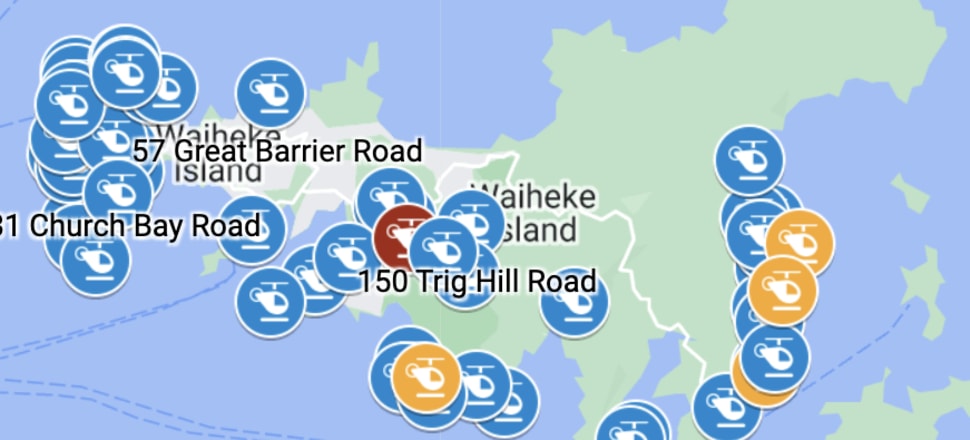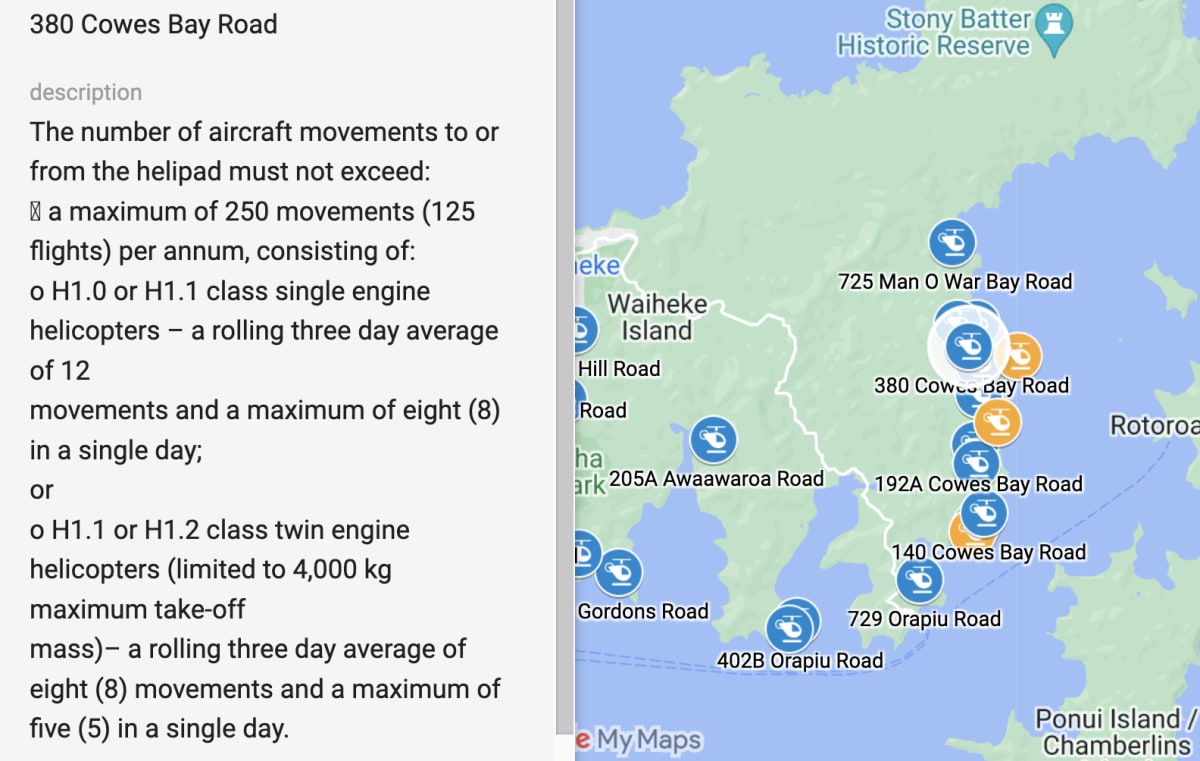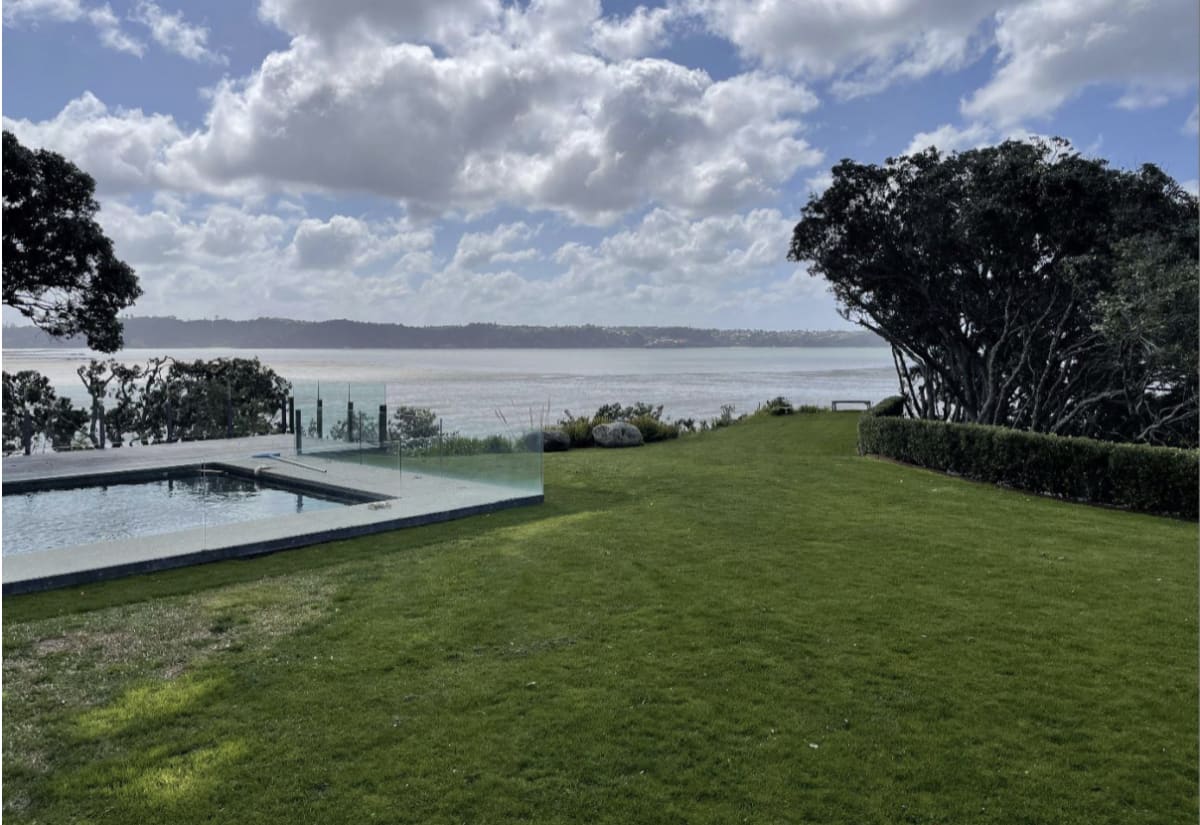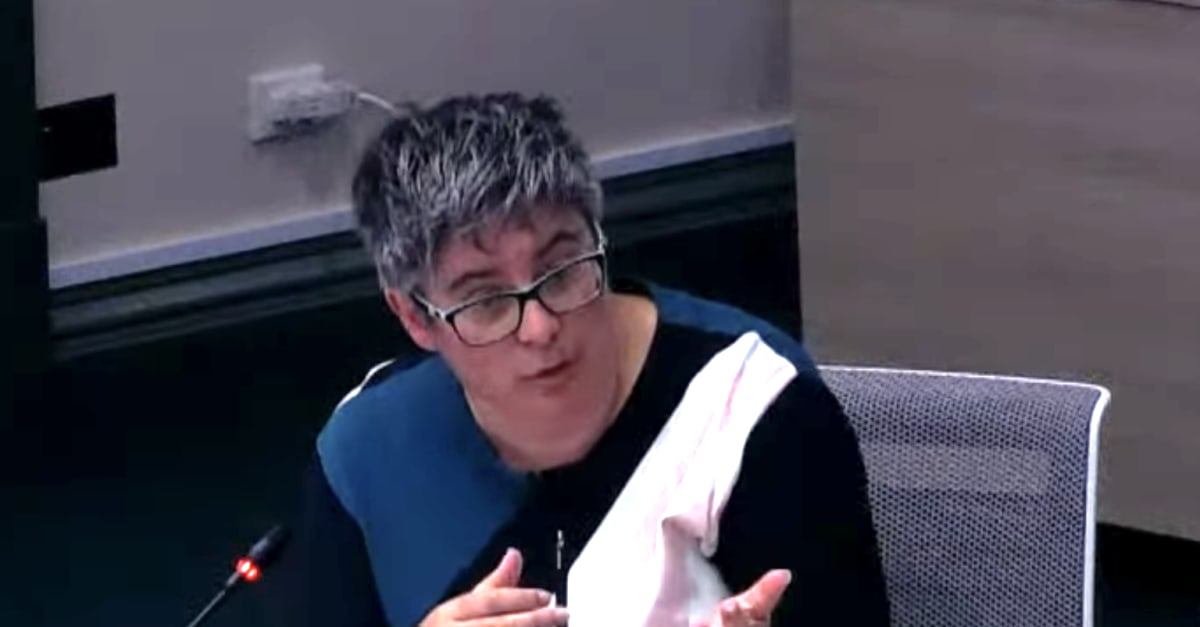
In 2019, Waiheke Island had 20 consented helipads. By March 2022 it was 49. Now it’s over 60 - and growing. In the second part of a three-part series, Nikki Mandow looks at the skies above Waiheke
Seventeen years ago, when Robin Tucker bought her home in Ostend, Waiheke Island, it was a pretty tranquil place. Birds, cars, a few neighbours with their lawnmowers. But helicopters? It never occurred to her that could be a problem.
Six years ago, that started to change, says Tucker, a keen cyclist and member of the Waiheke local board. At first there were just a few helicopters flying over her house, mostly at weekends, particularly in summer. And then there were more, and more, and more.
Suddenly it seemed vineyards needed helipads to get people over for lunch, private bach owners needed helipads to avoid the 45-minute ferry ride and drive either end, boutique accommodation and tourism operators needed helicopters to boost business at an increasingly popular destination.
Coastal land owners realised council planning rules had few barriers to consenting private helipads - you didn’t even have to ‘notify’ the application, meaning no one except your immediate neighbours need even know about it until helicopters started flying in.
In 2019, Waiheke residents counted up their helipads and realised with some concern there were 20 on the island. By the end of 2021 there were 49.
Now there are 61. READ MORE: Helipad fight: 2023 will be crucial The locals versus the helipads of the rich and famous
“It’s insane,” Tucker, tells Newsroom on a phone call during which helicopters are, indeed, audible. “One day we counted 28 flights over my house. There’s one going over right now. Technically he’s flying over water - there's an estuary - but in reality, he’s flying over our suburb.”
On Tucker’s part of the island, helicopters are taking people into the vineyards, and flying to houses on the eastern end with private helipads. Then there a whole bunch of vineyard and private landing pads on the west coast too.
The map at the top of this story is a screenshot of the interactive graphic below that Tucker has put together. It shows every consented helipad on the island, and for many of them she has collected detailed information about what the owners’ individual consent clause allows them to do.
At random, Newsroom checks out one spot at 1 Margaret Reeve Lane. Cross-reference it against a past real estate listing and the property turns out to be a pretty nice pad: a five-bedroom, four-bathroom home on five hectares of land, with a separate two-bedroom, one-bathroom cottage which “might be used for an au pair”.
Owners or visitors can fly into the helipad up to four times a day, or 24 times a year.

Over on the less populated east coast, helipad owners get more flights. At 380 Cowes Bay Rd, described as an “exclusive, private, gated community set in 26ha of lush bush... home to native birds and sea-blue views”, residents are allowed 250 ‘movements’ a year, with a maximum of eight a day in a single-engined helicopter or five in a twin-engine machine.
A ‘movement' is one helicopter flight, either landing or taking off.

“This is a loud, disturbing, disruptive noise,” Tucker says. “It’s so loud, if you are in the garden, you can’t hear yourself speak.”
Ask and it shall be given to you
So how did this proliferation of helipads happen? How come so many people have been given permission to land helicopters on Waiheke?
Simple: they just asked the council.
The Hauraki Gulf Islands section of the Auckland Council District Plan sets rules for Waiheke and Aotea/Great Barrier islands, just as the Auckland Unitary Plan dictates rules on the mainland.
Putting in a helipad in a residential area requires a resource consent; in rural areas, the rules state you need a resource consent "if it is for private activity that is not related to farming or rural business activity".
But the Hauraki Gulf rules for Waiheke and Aotea/Great Barrier are more lenient for helipad wannabes than the unitary plan rules on the mainland, largely because in the early 2000s it was considered positive for tourism to let more helicopters in.
Under the unitary plan, helicopter takeoff and landing is a 'non complying activity', giving the council unlimited power to regulate them. In the Gulf, they are a 'restricted discretionary activity' meaning conditions on operators and helipads are limited to visual and noise effects.
History suggests Auckland Council is almost certain to say yes if you want a helipad without any public scrutiny - ‘notification’ in council speak.
Council 'notification' comes in three forms. 'Public notification' gives everybody the right to have a say on a planning or other application. 'Limited notification' is when council decides who is deemed affected - it may be some or all neighbours.
But when it comes to helipads on Waiheke, applications are completely non-notified.
"We have one example of someone with a property adjacent to a vineyard who was about to start work on a visitor accomodation unit only to discover that a helipad consent had already been given to the neighbouring property just a few metres from the proposed unit," Kim Whitaker says. "She had no forewarning that it was even in the pipeline. Subsequently a further application went in and was granted to increase the number of movements per year by 300 percent.
When Quiet Sky investigated the council’s history of consenting of helipads, it found in almost every case applications were approved on a non-notified basis. Locals didn’t even know the application was happening, let alone have a chance to object.
READ MORE Officials ‘too busy’ to change rules on Gulf helipads
And helipads tend to be super easy to ‘build’. You don’t need hangers or even a concrete landing pad - just a bit of flat grass.
The consent application for former All Black Ali Williams to put a helipad on his lawn in the central Auckland suburb of Westmere shows this (below) as the site.

When David Parkinson, who made his fortune from businesses including printer cartridge filling retailer Cartridge World, put his $24 million six-bedroom, seven-bathroom mansion at Church Bay on Waiheke up for sale in 2019, it was marketed with a helipad on land overlooking the ocean. The lawn the helicopters took off from doubled as an outdoor entertaining spot. The bar was wheeled away when flights were expected.
Ironically, as the concern from locals has increased, so has the flurry of helipad applications. It seems there’s a FOMO (fear of missing out) effect - people who don’t have a helipad yet worry the council will tighten the rules in the future.
“Half an hour ago there were three circling at one time,” Tucker says. “There’s no way council or the Civil Aviation Authority are able to monitor [whether owners are keeping to their consent conditions]. Anyway it doesn’t matter. If each helipad has approval for a certain number of landings in a three-day period, and their allocation is full, they just land at the next one.”
On a sunny Saturday in summer you might have almost constant helicopter noise, she says. A chopper trip to Waiheke has become a tourist or bucket list activity.
“Maybe I’m in Auckland and it’s my anniversary, my special birthday, it’s a treat to fly to Waiheke. I am only thinking of my flight, but there are hundreds of people doing that.”
A quick Google search shows a helicopter flight to a Waiheke vineyard, including a meal, wine tasting and the ferry home, can be had for $1500 for two people.

“Local people see Waiheke as a sanctuary, a paradise," Tucker says. "Meanwhile, we have a climate emergency and people are rocking up in helicopters."
There's been a definite change in the demographics on the island over the last 10 years, she says. "There are a lot more wealthy people living in coastal areas. Seems it’s far easier to drive to [the north Auckland suburb of] Albany and get on a helicopter than go downtown to the ferry. It’s insane.”
Quiet Sky Waiheke and other groups want changes to the Auckland Council’s consenting rules so it can better control helicopter activity. The council says changes are long, complex and expensive. Until recently, it has insisted nothing happen until the scheduled review of the Auckland Unitary Plan in 2026.
By then, Waiheke residents say, there’s no knowing how many helicopters will be flying overhead. And unlike, say, a dog licence, which has to be renewed every year, a helipad consent is for ever.
Chris Sattler was born in Germany and spent time in the German airforce before moving into the aviation finance industry and coming to New Zealand. These days he’s chief executive of Island Aviation, a business which takes people round the gulf in small planes, and is also half owner of Waiheke Island's Reeve Airfield.

He says a helicopter is generally much more noisy than a small plane, because planes can glide. Meanwhile, helicpoters need a lot of power - and therefore noise - to get them off the ground - and keep them there.
In New York City, helicopter noise complaints about helicopters went from around 1000 a year in 2018 to 23,000 in 2022, according to an article in Bloomberg last month. The problem is twofold: more flights (tourists checking out the Statue of Liberty, rich business people heli-commuting from holiday homes out of town, and busy executives going from downtown to the city’s JFK airport); plus more people working from home, meaning they are less likely to be in sound-proofed offices, and more likely to be in their apartment with the windows open.
“The noise of helicopter taxis...is so loud Lara O’Brien has to keep her Zoom calls on mute when she works from her Brooklyn home,” the article says.
“‘They rattle our apartment. The floor shakes’.”
The New York City Council is considering a bill banning non-essential helicopter traffic from city-owned heliports in Manhattan.
On Waiheke, it’s the private-owned helipads causing the noise problem, resident Robin Tucker says. It’s Tucker who suggests Newsroom call Waiheke Airport owner Chris Sattler for this story - she says residents want an airport; they don’t want 61 helipads.
The more traffic, the higher the risk
Sattler recognises he might be accused of self-interest when he speaks out against private helipads, but he is concerned the seemingly uncontrolled proliferation of helicopters in the skies over Waiheke and the central city has implications for noise - and potentially for safety.
“I don’t want to be alarmist, and if everyone follows the rules the flights can be done safely. But the more traffic there is, the more likelihood something will happen - it’s just an issue of probability.”
Last week, four people were killed when two helicopters operating scenic flights for Gold Coast theme park Sea World crashed into each other. One was taking off, the other landing at the busy helipad - Australia's largest privately-owned facility. Sea World Helicopters offers five-minute scenic flights scheduled to take off every 10 minutes over a busy stretch of coastline. Flights cost as little as A$75 per person.

Sattler says Waiheke airport has banned two pilots in the last four months because they weren’t following procedures, but there’s no way of knowing whether less skilled operators are flying into private helipads.
“That’s a benefit of having an airport - you have safety and monitoring equipment. But when you have people going everywhere, there’s not the same level of scrutiny.”
Sattler says the rules in Auckland are pretty loose by international standards when it comes to consenting helipads and monitoring flights.
“I can’t understand why people have a helipad in a private house. In Sydney that’s not allowed, no matter how wealthy you are. I have no idea why there need to be more than 15 helipads in the vicinity of Oneroa [Waiheke’s main centre] and why the council doesn’t look at the cumulative effect of all those helipads.”
While each helipad might have limits on the number of flights in and out over the course of a week, on a sunny weekend day there’s nothing stopping everyone choosing to use their weekly flight allocation at the same time. But the council doesn’t take into account the potential for cumulative - and sometimes almost constant - noise impact on neighbours enjoying the good weather in their gardens when it consents individual helipads.
Unlike a dog licence, which has to be renewed every year, a helipad consent is for ever.
Helicopters are a mixed blessing for Waiheke airport, Sattler says.
“Council are saying to us: ‘Take more helicopters, take more helicopters’, but I don’t want more helicopters because it’s so disruptive. We want some revenue to keep the airport open, but we want to be responsible and to manage the impact on our neighbours.”
Megan Tyler, chief of strategy at Auckland Council’s chief planning office, says complaints and concerns around the amount of helicopter activity around the Hauraki Gulf have escalated over the past 12 to 18 months. Waiheke Islanders are particularly concerned about the noise and disruption, about how resource consent applications are notified and considered, and whether consent holders are complying with consent conditions.
In an opinion piece on the Auckland Council website, Tyler acknowledged the concerns but said councils were faced with challenges finding a balance between competing interests.
“The first challenge we face is that our authority is limited to consideration of take-offs and landings including noise, number of flights and the visual impacts of helipads. Regulating overflying activity comes under Civil Aviation Authority rules and is mostly limited to the airspace over airports.
“Any changes to the Auckland Unitary Plan to make helicopter activity prohibited in residential and coastal areas would need to meet an extremely high legal bar. It would be difficult to justify a blanket prohibition on recreational helicopters in residential areas and there would likely be substantial opposition.
Protestors want all further private helipads banned ("Zilch, no helipad applications", as councillor Mike Lee puts it).
That's not as easy as it sounds, Tyler says.

“Placing a moratorium on accepting helipad applications is not provided for in the Resource Management Act, meaning the council cannot lawfully impose this.
“Regarding notification of helipad consents, while the Hauraki Gulf Islands District Plan allows the council to consider public or limited notification under special circumstances, the rules state this must be done on a case-by-case basis and not as a blanket approach to all applications, which would be legally indefensible.”
Opponents disagree. They say the council is disregarding existing national and local rules when it consents private helipads, and could put a moratorium on now, if it chose. (More on this in part three.)
The next few months will see the issue hotting up further. It’s not only residents frustrated by council planner inaction, but the council's own planning, environment and parks committee has raised concerns, as have the Waiheke, Waitematā amd Aotea/Great Barrier local boards.
In a memo sent out the week before Christmas, the council said it was winding up a helicopter monitoring project over the summer and would then be considering its options and reporting back.
“Plan changes are long and complex processes which require comprehensive research to ensure they are well-informed,” the council’s regional planning manager Warren MacLennan told Newsroom.
In part three, tomorrow: One of the biggest frustrations from the anti-helipad lobbyists is there appear to be several existing bits of legislation which would already rule out private helipads. They say the council isn’t following its own - and central Government’s - rules
If you missed the first part of our series, on why 2023 is shaping as a crucial year for the fight against helipads, you can read it here







